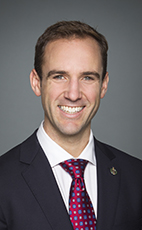Mr. Speaker, I would that hope my colleague across the way, as well as every member, would agree that Canada enjoys a long-standing and close strategic partnership with the European continent. We are connected by our values, valour, heritage, and many other commonalities.
We also face common issues, such as peace and security, climate change, and migration. Such challenges can only be resolved with effective global co-operation, in which the EU-Canada partnership must play a significant role.
Under our government, we now have two major levers to enhance our joint action with our European counterparts. First is the Canada-EU Comprehensive Economic and Trade Agreement. Second is its political counterpart, the new strategic partnership agreement. These two levers leave us better equipped than ever.
On September 21, just last month, CETA was provisionally implemented, the most progressive trade agreement ever negotiated.
This historic agreement that our government proudly signed on October 30, 2016, in Brussels gives Canadian businesses across the country unprecedented access to the European Union, the world's second-largest market, with over 500 million consumers and a $21-trillion gross domestic product.
Even more, with CETA, the EU and Canada can now show the world there is no need to choose between trade and progress. To maximize our chance for success in strengthening our relationship with Europe, to advance our security, social, and economic interests, Canada now has a new resource, a senior diplomat to Europe.
Canada is currently engaged in 36 bilateral missions in 32 countries. We can increase this already strong presence by taking a consistent pan-European approach. Ambassador Dion, a renowned Canadian, has always fought for a better, greener, and more united Canada. He is also extremely knowledgeable about Europe and strongly believes in the importance of a transatlantic relationship. These are the values and skills that he brings to the position of Canada's ambassador to Germany and special envoy to the European Union and Europe.
In fact, after just taking up his post earlier this year, our ambassador has already participated in the NATO summit in Brussels; the Globesec Forum 2017, one of the top global security conferences in central and eastern Europe; a trade mission to Italy; the EU development days, possibly the largest gathering on international development issues; the G20 summit in Hamburg; the Woodrise conference, promoting the Canadian forestry sector; and most recently, an academic conference on inclusiveness, an important value that needs our promotion, especially in today's global climate.
Ambassador Dion's presence at these important engagements puts Canada at the table with our European counterparts to tackle the biggest issues of our time, issues that have no borders and need collaboration on to achieve real results.
We are honoured to have Mr. Dion represent Canada and stand up for our interests in his role as ambassador to Germany and special envoy to the European Union and Europe.

